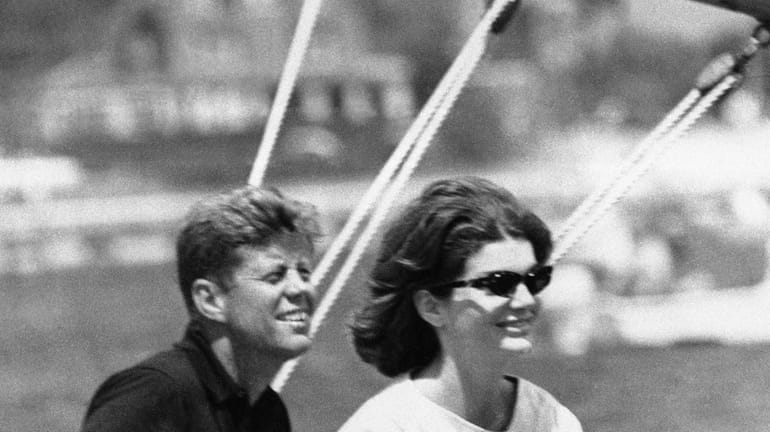Swanson: The genesis of the Kennedys' Camelot

Then Sen. John Kennedy and his wife Jacqueline sit in their sailboat in Hyannis Port, Mass. Credit: AP, 1960
The day after Thanksgiving 1963, Jackie Kennedy called Theodore White, Pulitzer Prize-winning author of the bestselling book "The Making of the President: 1960" and a writer for Life magazine.
"I found myself talking to Jacqueline Kennedy, who said there was something that she wanted Life magazine to say to the country, and I must do it," White later recalled. She wanted him to come to Hyannisport right away.
He called his editors at Life, but they told him the next issue was about to go to press. They warned him it would cost $30,000 an hour to hold the presses open for his story. It was unprecedented, but they would do it because an exclusive interview with first lady Jacqueline Kennedy was so coveted.
Jackie met with White alone, and he began taking notes as fast as his hand could scribble: "Composure . . . beautiful . . . dressed in trim black slacks . . . beige pullover sweater . . . eyes wider than pools . . . calm voice." For the next several hours, she delivered a jumbled narrative about Dallas, the blood, the head wound, the wedding ring, the hospital, and how she kissed him goodbye.
Then she confided to White, something she said had become "almost an obsession" for her. "At night, before we'd go to sleep . . . Jack liked to play some records . . ." She described a song from a Broadway musical fantasy about King Arthur's court. "The lines he loved to hear," Jackie revealed, were, "Don't let it be forgot, that once there was a spot, for one brief shining moment that was known as Camelot."
Jackie went on: "There'll be great presidents again -- and the Johnsons are wonderful, they've been wonderful to me -- but there'll never be a Camelot again."
Life needed the story before he left Jackie, and he began dictating it over a wall-hung telephone in her kitchen. He had already allowed her to pencil changes on the manuscript. As White spoke on the phone, Jackie overheard that his editors in New York wanted to tone down and cut some of the "Camelot" material. She glared at White and shook her head.
One of his editors caught the stress in his voice and suspected Jackie. "Hey," he asked White, "is she listening to this now?"
The moment was Jacqueline Kennedy's tour de force, her finest hour. She had summoned an influential author to do her bidding -- and like so many men she had mesmerized before, he did it.
And it worked. Thanks to Theodore White's essay, "For President Kennedy: An Epilogue," Camelot and its brief shining moment became one of the most celebrated and enduring myths in American politics.
On the stormy night that Jackie Kennedy summoned Theodore White to Hyannisport, she set in motion the most powerful legend in the history of American politics. Since then, the aura of Camelot has been the envy of every American politician who has ever sought public office. John Kennedy's engaging confidence, easy wit, self-deprecating humor and athletic good looks set an impossible to match gold standard of style that no subsequent president has equaled or surpassed.
There have been other fine presidents, but no more Jack Kennedys. Because of his untimely death in the middle of his unfinished life, his image remains fixed in the American mind as forever young, as promise unfulfilled.
Jackie Kennedy recognized the apotheosis. He had become, she said, a legend when he would have preferred to be a man. JFK's legend has overshadowed every man who has held the presidency since that day in Dallas in November 1963.
James L. Swanson is the Edgar Award winning author of The New York Times bestseller "Manhunt: The 12-Day Chase for Lincoln's Killer." This is adapted from his new book, "END OF DAYS: The Assassination of John F. Kennedy."
